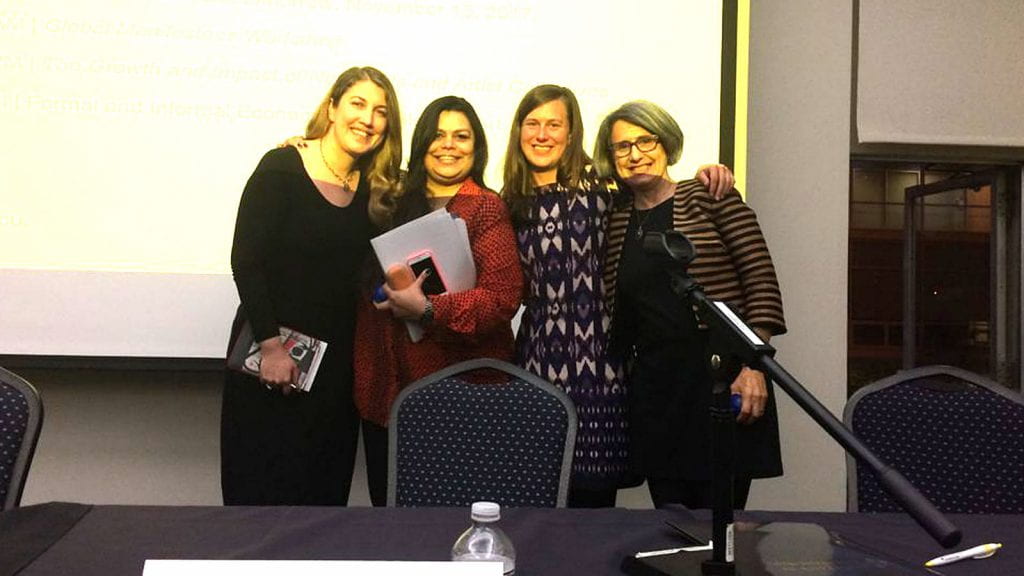During this All-Day Writing Event on Saturday, February 3, 2018, participants worked with an editor for a 20-minute session. While the editor focused on academic writing, participants submitted other work for feedback on style and structure. This event was co-sponsored by the School of Nursing and Health Professions.
Recent Events
Blogging and Advocacy for Social Justice
 In this workshop, Huffington Post blogger and USF Associate Professor Rick Ayers (Teacher Education) shared writing prompts and exercises to connect with readers and promote extended public discourse in crucial issues. During the two-hour session, faculty writers brainstormed and drafted ideas and worked in pairs to refine their blog ideas. Participants felt that Ayers led a productive writing session and had useful advice on developing their voice.
In this workshop, Huffington Post blogger and USF Associate Professor Rick Ayers (Teacher Education) shared writing prompts and exercises to connect with readers and promote extended public discourse in crucial issues. During the two-hour session, faculty writers brainstormed and drafted ideas and worked in pairs to refine their blog ideas. Participants felt that Ayers led a productive writing session and had useful advice on developing their voice.
Read more about blog writing in Rick Ayers’s “How to come up with an interesting and meaningful blog post or public scholarship.”
Thinking Through Drawing: Rubens and the Rhetorical Art of Eloquence

Following the recent publication of her monograph, Rubens and the Eloquence of Drawing (Routledge/Ashgate, 2017), Associate Professor Kate Lusheck (Art History & Museum Studies) discussed the graphic art of the great, seventeenth-century painter, Peter Paul Rubens (Flemish, 1577-1640) in light of the historical and rhetorical concept of eloquence. In this large lecture style talk, Lusheck presented a close, case study approach, focusing in detail on how one Rubens drawing of Medea and her dead children powerfully demonstrates the artist’s interest in drawing together form and content through an unusually conscious approach to style and emulation. Cross-disciplinary in her concerns, Lusheck demonstrated how such spectacles of graphic eloquence, grounded in borrowing from ideas located in great texts and objects of the distant and recent past, highlight Rubens’s fascination with creating more conceptually robust models of design. She contends that in the end, such drawings reflect the inimitable ways of thinking of an erudite, humanist artist who loved to design as much in his mind as on paper.
Developing a Five-Year Plan
This interactive workshop, designed for early-career faculty, provided a framework and tools to create a five-year plan to help faculty achieve their professional goals in the academy. Faculty learned strategies for time management and received resources to help with developing their plans. During the workshop, faculty identified gaps in their current projects and created their tenure timelines. The workshop was facilitated by Michelle Millar, Associate Professor in the School of Management and Genevieve Negrón-Gonzales, Assistant Professor in the School of Education.
To learn more about the strategies discussed during the event, read Negrón-Gonzales’s post “Making a Five-Year Plan.”
Passage: A Reading and Conversation with Author Khary Lazarre-White
 During this reading and conversation, author Khary Lazarre-White discussed his work as a social justice advocate and founder of the award-winning youth development organization The Brotherhood-SisterSol that supports the empowerment Black and Latinx youth in New York City. Lazarre-White read an excerpt from his novel Passage, which tells the story of Warrior, a young Black man navigating police brutality, structural racism, and the snowy winter streets of Harlem and Brooklyn in 1993. Though the story takes place in 1993, there is a striking parallel between Warrior’s experience and the experiences of Black male youth today. This event was moderated by Assistant Professor Samira Abdur-Rahman from the Department of English.
During this reading and conversation, author Khary Lazarre-White discussed his work as a social justice advocate and founder of the award-winning youth development organization The Brotherhood-SisterSol that supports the empowerment Black and Latinx youth in New York City. Lazarre-White read an excerpt from his novel Passage, which tells the story of Warrior, a young Black man navigating police brutality, structural racism, and the snowy winter streets of Harlem and Brooklyn in 1993. Though the story takes place in 1993, there is a striking parallel between Warrior’s experience and the experiences of Black male youth today. This event was moderated by Assistant Professor Samira Abdur-Rahman from the Department of English.
Read more about the event and Passage in Samira Abdur-Rahman’s post “Encountering the City and the Self in Khary Lazarre-White’s Passage.”
Digital Humanities: Possibilities and Projects

This 90-minute program featured inspiring visions and projects in Digital Humanities (DH) research and challenges faculty to imagine the potential of using DH in their own work. Presenters included professors Nathan Dennis and Karen Fraser (Art History/Arts Management and Museum Studies), David Silver (Environmental Studies and Urban Agriculture), and Gleeson Assistant Librarian Colette Hayes. This event was moderated by Michael Rozendal (Rhetoric and Language).
This CRASE panel was especially designed for faculty looking for inspiration in tackling their own DH projects, and/or those wishing to learn more about a range of research methodologies and projects in this ever-expanding digital arena.
Read more about the topic in Colette Hayes’s post “Adventures in Digital Humanities.”
Learn more about Digital Humanities Projects:
Digital Humanities Projects at Stanford
Digital Humanities Spotlight: 7 Important Digitization Projects
Writing a Strong Grant Proposal: Advice from a Grant Editor
During this interactive workshop, grant editor Crystal Herron provided advice on how to prepare and write a strong grant proposal. She shared common mistakes and offered suggestions and strategies for preparing a fundable proposal. Faculty participants also met with the director of the Office of Contracts and Grants (OCG), Don Campbell, and learned about the grant application process at USF and resources available to faculty. Faculty appreciated the specific feedback and tips from the editor and had time to apply the concepts during a working session.
10 x 10: Ten Objects, Ten Stories

Ten members of the University of San Francisco community responded to ten unique objects in Something from Nothing: Art and Handcrafted Objects from America’s Concentration Camps. Artifacts were created by people of Japanese ancestry while being held in detention centers— Department of Justice camps and ten permanent camps. Perspectives incorporated personal history and stories, scholarly analysis, and creative expression. The event featured perspectives from each presenter and was followed by a reception.

Contributors included:
- Hana Mori Böttger (College of Arts and Sciences, Art + Architecture)
- Brian Dempster (College of Arts and Sciences, Rhetoric and Language)
- Sara Fan (Center for Research, Artistic, and Scholarly Excellence)
- Saera Khan (College of Arts and Sciences, Psychology)
- Sherise Kimura (Gleeson Library | Geschke Center)
- Nick Large (Information Technology Services)
- Noriko Milman (College of Arts and Sciences, Sociology)
- Brynn Saito (College of Arts and Sciences, Master of Fine Arts in Writing Program)
- Peggy Takahashi (School of Management, Associate Dean of Undergraduate Programs)
- Ken Yoshioka (Information Technology Services)
Read responses from our presenters:
Sherise Kimura “Enemy Alien: Uncovering Family History”
Ken Yoshioka “Return to Topaz“
Plan Your Semester
Christine Yeh, Professor in the School of Education, led an interactive workshop where faculty created a specific semester plan to accomplish their research and writing goals. Participants strategized on how to navigate and balance multiple professional and personal goals. During the event, faculty learned about how many tasks actually go into each discrete goal, how to evaluate how much time each task takes, and the benefits of scheduling tasks on the calendar. Yeh also provided different strategies for being accountable for your research.
Participants felt that the workshop was helpful because it was very concrete and hands-on.
For more information about planning your semester, read Christine Yeh’s post Tips for Creating a Semester Plan for Faculty Success in Writing and Research.
Global Manifestos Workshop
Organized by:
Pedro Lange-Churion, Modern and Classical Languages
Tanu Sankalia, Art + Architecture
Sumer Seiki, Teacher Education
John Zarobell, International Studies

Global Manifestos was an innovative workshop for students, faculty and the public that encouraged individuals to share their experiences and reactions to the changes in the art community wrought by globalization. This event was part of the Forum for Transnational Collaboration that occurred on November 17th-18th, 2017, which brought scholars from around the world to voice their perspectives on how globalization has affected the art world in their own domains. The workshop provided an opportunity to elaborate on these vocalizations by giving all participants an opportunity to express their own views on globalization in the form of a manifesto that can be articulated in 60 seconds or less. Further, the organizers of the event (all members of the CRASE Art and Globalization Faculty Research Circle) brought camera equipment out to Oakland’s First Friday Arts Walk on October 6th and to the Minnesota Street gallery complex on October 14th to film public participation outside of the academy. We encouraged all participants to speak impromptu, but we also worked with USF students, faculty, and staff to script manifestos during the first day of the Forum that they could read or designate for others to read at the recording on November 18th. All of the participants of the forum were asked to draft or improvise a manifesto on globalization to ensure that many different global perspectives were represented.
Dialogue In Between from Pedro Lange on Vimeo.
The goal of the Global Manifestos Workshop was to present an alternative to the model of economic globalization by providing a platform for multiple and diverse articulations on globalization. The voices of artists, curators, and critics who do not operate in the United States and Europe have been considered marginal but scholars and professionals need to rethink these norms. Further, the sense the public has about the effects of globalization on their daily lives has not been explored in this context. Thus, the focus was to explore the developments of artists and institutions from the (former) periphery that diffuse their own innovations into global culture and, in so doing, transform the meaning of the visual arts, social dynamics and market processes of the art world. We believe that alternative geographies result from new cultural and economic patterns and these develop unprecedented networks of engagement and participation that this forum was able to capitalize on. The resulting film not only presents the global participants, but also local voices from various communities throughout the city who were encouraged to record their own views. We found locals—old and young, with a variety of professional experiences, ethnic backgrounds, and perspectives on the impact of globalization in their lives—to speak on camera. In this way, we have sought to maximize the variety of voices that contribute to the fabric of the completed film.
Jose Luis Aranda, a graduate student from USF, worked with Director Pedro Lange-Churion to edit the final version of the film so none of the manifestos are viewed in complete form. This intentional approach contributes to a kaleidoscopic whole that reflects a wide array of voices that exemplify diversity and demonstrate the many perspectives on preservation in the midst of change.

